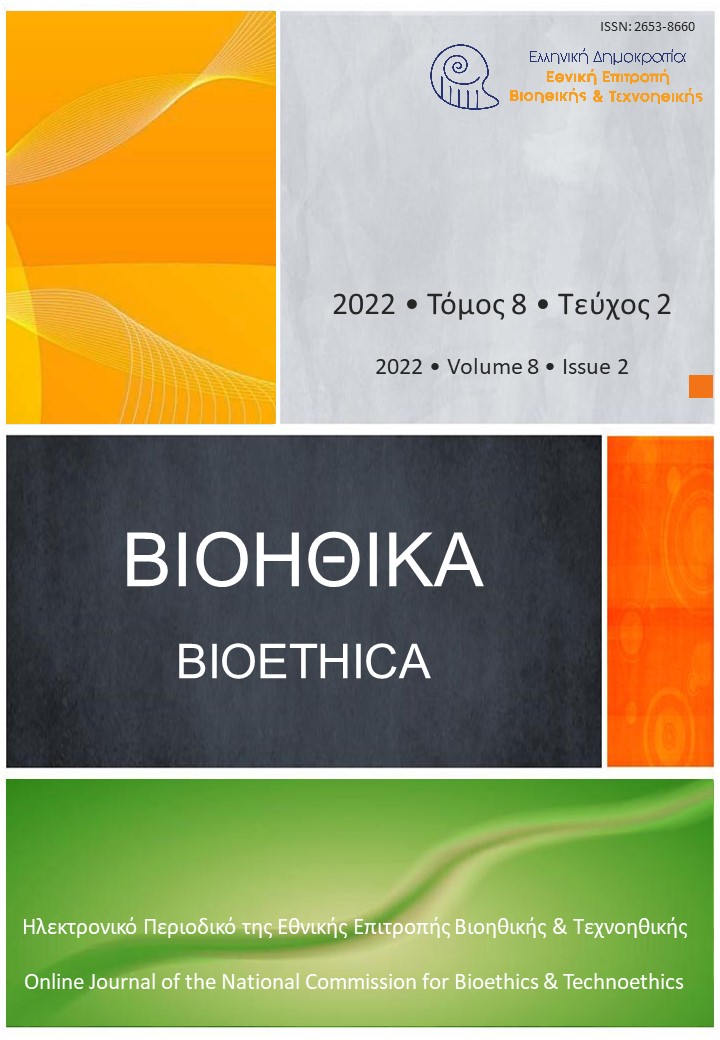Το πένθος προσφέρει ζωή: Βιοηθικοί προβληματισμοί στο πεδίο των μεταμοσχεύσεων
Abstract
Οι μεταμοσχεύσεις οργάνων ανθρωπίνου σώματος, είτε από ζώντες, είτε από νεκρούς δότες, με την πρώτη επιτυχημένη επέμβαση να πραγματοποιείται το 1954 από την χειρουργική ομάδα του Joseph Murray, αποτελούν ένα από τα σημαντικότερα επιτεύγματα της Ιατρικής επιστήμης κατά την διάρκεια του 20ου αιώνα, συγκρινόμενη ίσως, μόνο με ανακάλυψη της πενικιλίνης από τον Fleming το 1928 και του εμβολίου ενάντια στην πολιομυελίτιδα από τον Salk το 1955. Στην χώρα μας, η πρώτη επιτυχημένη μεταμόσχευση νεφρού πραγματοποιήθηκε στην Θεσσαλονίκη, το 1968. Με την παρούσα ανασκόπηση της βιβλιογραφίας θα παρουσιαστούν με λεπτομέρειες μία σειρά από πτυχές, οι οποίες χαρακτηρίζουν την δυναμική και τις προοπτικές που έχουν οι μεταμοσχεύσεις στην Ελλάδα.
Δυστυχώς, σε αντίθεση με πολλές χώρες της Ευρώπης και της Αμερικής, στις οποίες σταδιακά διαπιστώνεται αύξηση, χρόνο με τον χρόνο του αριθμού των πραγματοποιηθέντων μεταμοσχεύσεων οργάνων σώματος, στην χώρα μας τα στοιχεία δεν απέχουν πολύ από το να χαρακτηριστούν απογοητευτικά, με τον δείκτη δωρεάς (δότες ανά εκατομμύριο πληθυσμού) να κυμαίνεται στο επίπεδο του 4.7, με τον Ευρωπαϊκό μέσο όρο να είναι άνω του 20. Τα αίτια για τις άσχημες αυτές επιδόσεις είναι πολλά – ανάμεσά τους τα διαχρονικά προβλήματα εμπιστοσύνης που διακατέχουν την ελληνική κοινωνία σε σχέση με τις διαδικασίες μεταμόσχευσης οργάνων, η πλημμελής στήριξη των προσπαθειών από τα μέσα μαζικής ενημέρωσης, η ελάχιστη συμμετοχή των διαφόρων βαθμίδων της εκπαίδευσης, οι σημαντικές ελλείψεις σε υποδομές και καταρτισμένο προσωπικό και βέβαια, πρόσφατα, η πανδημία της νόσου COVID-19, η οποία έχει επηρεάσει δυσμενώς την παγκόσμια μεταμοσχευτική δραστηριότητα.
Προκειμένου να αναταχθεί η συγκεκριμένη δυσμενής εικόνα, χρειάζεται να γίνουν άμεσα στοχευμένες δράσεις, ανάμεσα στις οποίες περιλαμβάνεται η συνεχής ενημέρωση του κοινού και η σημαντική ενίσχυση και συνεχιζόμενη εκπαίδευση του επιστημονικού και υλικοτεχνικού δυναμικού σε όλα τα γενικά νοσοκομεία της χώρας. Σημαντικό ρόλο στον συγκεκριμένο στόχο έχει η εισαγωγή και στην χώρα μας του θεσμού του βιοηθικού διαμεσολαβητή, ο οποίος με τις εξειδικευμένες γνώσεις του θα μπορέσει να επιλύσει πολλά από τα νομικά και ηθικά διλήμματα, τα οποία προκύπτουν σε καθημερινή βάση στο πολύπλοκο πλαίσιο της μεταμόσχευσης οργάνων σώματος, και για τα οποία, έως και σήμερα δεν είναι επαρκώς καταρτισμένοι να αντιμετωπίσουν οι επιστήμονες υγείας οι οποίοι εμπλέκονται στα διάφορα στάδια της διαδικασίας.
Article Details
- Come citare
-
Ζάννη Α. (2022). Το πένθος προσφέρει ζωή: Βιοηθικοί προβληματισμοί στο πεδίο των μεταμοσχεύσεων. Bioethica, 8(2), 47–63. https://doi.org/10.12681/bioeth.31779
- Fascicolo
- V. 8 N. 2 (2022): Bioethica
- Sezione
- Original Articles

TQuesto lavoro è fornito con la licenza Creative Commons Attribuzione 4.0 Internazionale.
Authors who publish with this journal agree to the following terms:
- Authors retain copyright and grant the journal right of first publication with the work simultaneously licensed under a Creative Commons Attribution CC BY 4.0 License, which allows for immediate free access to the work and permits any user to read, download, copy, distribute, print, search, or link to the full texts of articles, crawl them for indexing, pass them as data to software, or use them for any other lawful purpose. Appropriate credit must be given by citing the author(s) and the original publication in this journal.
- Authors are able to enter into separate, additional contractual arrangements for the non-exclusive distribution of the journal's published version of the work (e.g. post it to an institutional repository or publish it in a book), with an acknowledgement of its initial publication in this journal.
We encourage authors to deposit their articles, as well as data underlying the publications, in institutional and/or other appropriate subject repositories.
Bioethica permits and encourages authors to archive the final publication pdf in institutional (e.g. the repository of the National Hellenic Research Foundation) or other appropriate subject repositories (e.g. SSOAR repository for social sciences), in compliance with institutional and/or funder open access policies, after publication in the BIOETHICA. Authors must provide bibliographic details that credit publication in the journal, as well as related funding details (when applicable).
Lists of institutional and other subject-based academic open access repositories can be found listed by country at the registry http://opendoar.org/countrylist.php
If your institution does not possess a repository you may deposit a copy of your paper at no cost with www.zenodo.org , the repository supported for open access research in the EU by the European Commission, through the project OpenAIRE (www.openaire.eu )



